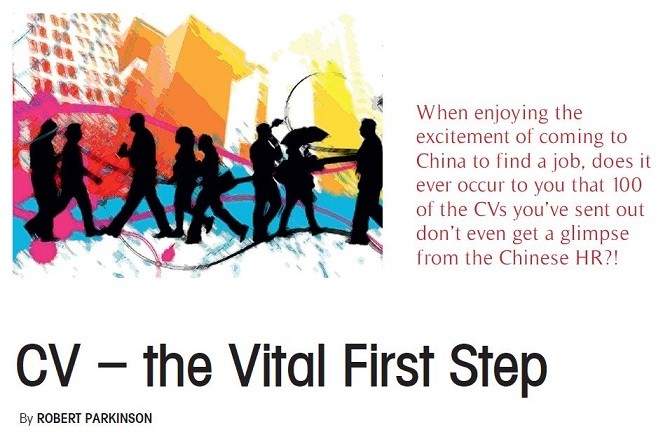Latest article from Robert Parkinson (CEO & Founder of RMG Selection) on China today! # CV – the Vital First Step# To keen overseas job seekers who want to work in China: When enjoying the excitement of coming to China to find a job, does it ever occur to you that 100 of the CVs you’ve sent out don’t even get a glimpse from the Chinese HR?! Find out how to present yourself in CV together with Robert now!
To keen overseas job seekers who want to work in China: While anticipating the excitement of coming to China to find a job, does it ever occur to you that maybe 100 of the CVs you’ve sent out won’t even get a glimpse from the Chinese company HR? Does that shock you? If you expect to get a good job because of your years of work experience and career achievements, would you believe that the Chinese HR might miss your point entirely? Having worked as a headhunter for 15 years and lived in Beijing for 10 years, I have read thousands of resumes from foreign job seekers, and can tell you that just a few changes on your CV could make your dream career in China a reality!
The first thing we need to understand is just exactly how long CVs are scanned for, particularly for junior and mid-level positions. It’s about 23 seconds. That’s all! So when you’re composing your CV, what you leave out is just as important as what you put in.For example, I’ve seen resumes that are literally flooded with information. I recently read one from a senior manager that was eight pages long! Piling on details about your work experience will only make HR workers lose interest. Of course, all work experience matters in one’s career, but you have to bear it in mind that it’s important to distill it down to key responsibilities and achievements, and write as concisely as possible.Last but not least, remember that you are only as good as your last deal. So you should devote the space that your experience of 15 years ago would take up to your current job. Employers aren’t so interested in what you did 15 years ago, so balance the space in your CV accordingly. As a general rule CVs should take two sides of A4. One page isn’t enough. But if it’s any longer than three sides, your CV will not be read.
Don’t be coy about photos or age. Specifying age might be banned in the U.S., but it isn’t here: age is relevant, so include it. Likewise, Chinese hiring authorities like to see photographs. But make sure the one you show isn’t a studio-style shot that is flattering but does not reflect your age! I met a candidate last week whose CV and the photo on it impressed me and gave me a good feeling. But when she entered my office it was clear that the photo had been taken 10 or more years earlier. This to me was tantamount to deception.
Don’t tell stories from the 1960s: I like reading biographies of people like Steve Jobs and Angela Merkel, and the career stories of job applicants take up a considerable share of my reading matter. But Chinese HR have absolutely no interest in the career stories applicants tell on their CV. Describing a job in the 1960s on a supermarket check-out is not really advisable, especially for senior job seekers. Another point I want to make is about the order of work experience. I strongly recommend reverse order – starting from the most recent job. This will instantly inform Chinese HR whether or not you fit the position. The same applies to education background part. Start with your most recent and most impressive academic degree to make the best HR impact.
Bullet points: Keep it brief: I clearly remember one of my university courses on writing cover letters. A cover letter is indispensable to job applications in most Western countries. But no matter how hard or long you work on your cover letter, it really makes no difference to HR people in China. Remember, the Chinese HR worker only allocates about 20 seconds to each CV. Nobody will spend extra time reading your cover letter. What you can do is to write a brief, professional e-mail. In my headhunter capacity, I suggest that this email include specific attributes, in the form of bullet points, which make you the right person for the company. This, again, will help Chinese HR workers spot your suitability for the job. Job hunting in a completely different country is no easy task, and your CV is the vital first step towards your Chinese dream career. Nobody expects their painstakingly prepared resume to be cast aside after a cursory glance. If you take a few minutes to incorporate in it my suggestions, I can more or less guarantee more responses from Chinese HR departments. If not, well, you can always come back to me, as long as you don’t apply for a position that bears no relation to your previous experience.
